Donside Village | |
|---|---|
 | |
| Country | Scotland |
| Council area | City of Aberdeen |
| City | Aberdeen |
Donside Village is a neighbourhood of Tillydrone in Aberdeen, Scotland.
Donside Village | |
|---|---|
 | |
| Country | Scotland |
| Council area | City of Aberdeen |
| City | Aberdeen |
Donside Village is a neighbourhood of Tillydrone in Aberdeen, Scotland.
Donside Village is a suburb of Aberdeen within Electoral Ward 6 and sits between Old Aberdeen, Tillydrone, Seaton Park, and Bridge of Don.
Donside Village occupies the former site of the Donside Paper Mill, which closed in 2001 and was torn down around 2006. [1] [2] Planning permission for a new development was obtained in 2008. [3] It is the location of Scotland's first urban hydro energy scheme. [4]
The local community of Donside Village is active [5] and regularly hosts events, such as the community theatre production of The River in 2017, and the Summer Fayre held on the second weekend in August. Beehives were sited in 2018 with the honey being harvested and sold in the village. [6]
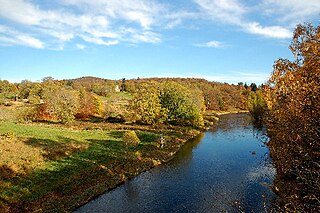
The River Don is a river in north-east Scotland. It rises in the Grampians and flows eastwards, through Aberdeenshire, to the North Sea at Aberdeen. The Don passes through Alford, Kemnay, Inverurie, Kintore, and Dyce. Its main tributary, the River Ury, joins at Inverurie.

Marr is one of six committee areas in Aberdeenshire, Scotland. It has a population of 34,038. Someone from Marr is called a Màrnach in Scottish Gaelic.

Aberdeen North is a burgh constituency of the House of Commons of the Parliament of the United Kingdom and it elects one Member of Parliament (MP) by the first past the post system of election. It was first used in the 1885 general election, but has undergone various boundary changes since that date. The seat has been held by Kirsty Blackman of the Scottish National Party since 2015.

West Aberdeenshire and Kincardine is a county constituency of the House of Commons of the Parliament of the United Kingdom of Great Britain and Northern Ireland (Westminster), which elects one Member of Parliament (MP) by the first past the post system of election. It was first used in the 1997 general election, but has undergone boundary changes since that date. West Aberdeenshire and Kincardine was re-created as a parliamentary constituency in 1997, having previously existed as Kincardine and Western Aberdeenshire from 1918 to 1950.
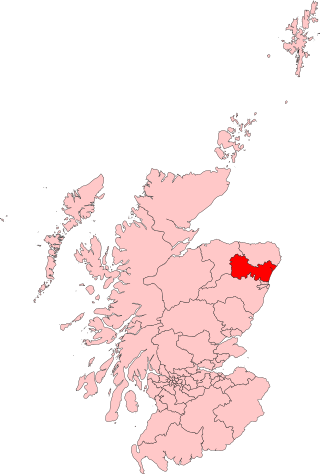
Gordon was a county constituency of the House of Commons of the Parliament of the United Kingdom (Westminster), which elected one member of Parliament (MP) by the first past the post system of election. The constituency was first contested at the 1983 UK general election; and underwent boundary changes throughout its existence.

Aberdeen Central is a burgh constituency of the Scottish Parliament (Holyrood) covering part of the Aberdeen City council area. It elects one Member of the Scottish Parliament (MSP) by the first past the post method of election. It is one of the ten constituencies in the North East Scotland electoral region, which elects seven additional members, in addition to ten constituency MSPs, to produce a form of proportional representation for the region as a whole.

Garioch is one of six committee areas in Aberdeenshire, Scotland. It has a population of 46,254, which gives it the largest population of Aberdeenshire's six committee areas. The Garioch consists primarily of the district drained by the River Ury and its tributaries the Shevock and the Gadie Burn.
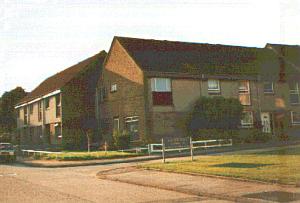
Tillydrone is an area of Aberdeen, Scotland. Lying north of the city centre and slightly north-west of Old Aberdeen, it is roughly bounded by the River Don, St Machar Drive, and the main Aberdeen-Inverness railway line.
The city of Aberdeen, Scotland, contains a number of areas and suburbs, some of which are historically separate settlements that have been absorbed by the expanding city.
Aberdeen is one of the most prosperous cities in Scotland owing to the variety and importance of its chief industries. Traditionally Aberdeen was home to fishing, textile mills, ship building and paper making. These industries have mostly gone and have been replaced with high technology developments in the electronics design and development industry, research in agriculture and fishing, and the oil industry which has been largely responsible for Aberdeen's economic boom in the last three decades.
Blelack is a place in Aberdeenshire, Scotland, the location of Blelack House, a Scottish mansion house with origins in the seventeenth century.

Corgarff is a hamlet in Aberdeenshire, Scotland, in the Grampian Mountains. The nearby Corgarff Castle was used as a military barracks in the 18th century. The hamlet's primary school closed in 1998.
This is an article about the 3 main paper mills in Aberdeen, Scotland.

Aberdeen Donside is a constituency of the Scottish Parliament (Holyrood) covering part of the Aberdeen City council area. It elects one Member of the Scottish Parliament (MSP) by the first past the post method of election. It is one of ten constituencies in the North East Scotland electoral region, which elects seven additional members, in addition to the ten constituency MSPs, to produce a form of proportional representation for the region as a whole.

St Mary's College, Blairs, situated near Aberdeen in Scotland, was from 1829 to 1986 a junior seminary for boys and young men studying for the Roman Catholic priesthood. Part of the former college now houses Blairs Museum, the museum of Scotland's Catholic heritage. The New Chapel is a Category A listed building, with the other buildings listed as Category B.
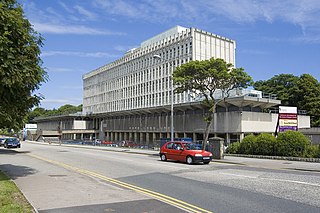
The Zoology Building is a facility owned by the University of Aberdeen. It is situated in Tillydrone.

The 2013 Aberdeen Donside by-election was a by-election that was held for the Scottish Parliament constituency of Aberdeen Donside on Thursday 20 June, following the death from cancer of the constituency's MSP, Brian Adam.

North East Scotland College was formed on 1 November 2013 from the merger of Aberdeen College and Banff & Buchan College. The regional college serves an extensive geographical area with its main centres in Aberdeen and Fraserburgh.
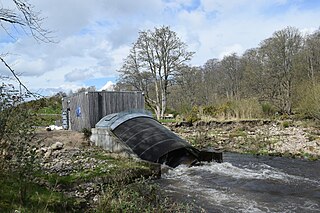
Aberdeen Community Energy operate a micro hydro scheme at Tillydrone on the River Don, Aberdeen.
The Garlogie Beam Engine is a steam powered beam engine, built in 1833, that once powered a woollen mill at Garlogie, Aberdeenshire. It is a rare survivor of the Industrial Revolution and the oldest steam engine of any kind still in its original location in Scotland. It contains what is believed to be the oldest cast iron engine beam in the world, dating from 1805.